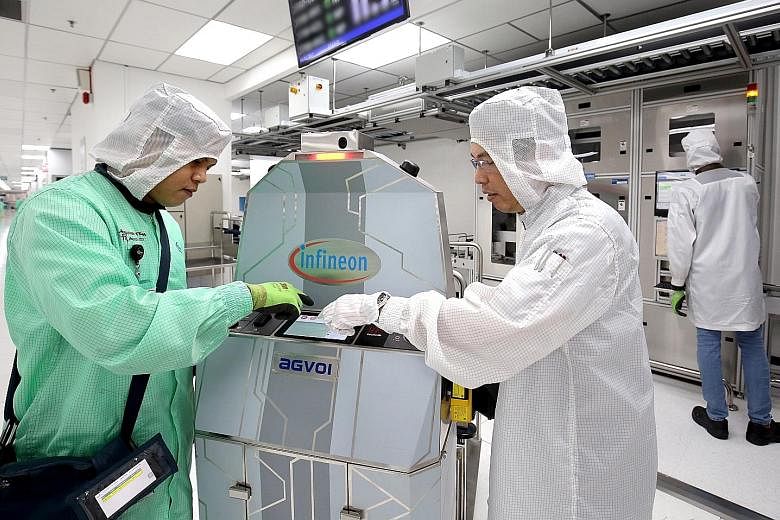Semiconductor giant Infineon is pumping about $105 million over five years into its Singapore plant to turn it into a "smart factory".
Production operations here will be linked in real time to other production sites, and the assembly line will be increasingly automated to boost productivity, said Infineon.
At a joint briefing with the Economic Development Board (EDB) yesterday, Infineon Technologies unveiled the progress its plant has made in advanced manufacturing.
Last year, the electronics manufacturing firm launched its Smart Enterprise programme in an attempt to increase the firm's capabilities.
Infineon president and managing director Andrew Chong said: "The Smart Enterprise programme aims to take full advantage of the entire production value network capability, and improves Infineon's competitiveness via innovation, quality and productivity."
Various technologies have been adopted as part of this programme.
Earlier this year, the first robotics and automated guided vehicles were deployed in the plant. These include two large robotic arms which manage the plant's automated storage and retrieval system.
The firm expects automation to eliminate errors in manual tasks, such as handling of materials in and out of storage, as well as microscopic visual inspection for defects.
Said Infineon vice-president Laurent Filipozzi: "In the past, labour-intensive jobs led to more accidents. With the new system, it's a lot more efficient because the robots are very precise so accidents are prevented.
"Manpower can also be utilised more effectively elsewhere now."
With the new smart manufacturing initiatives, the job demands of Infineon's engineers, technicians and operators have changed.
The introduction of new workflow, technology and robotics requires new skill sets in trouble-shooting and operating man-machine interfaces, said the firm. For example, connected mobile devices were recently introduced to push real-time notifications to operators and to replace verbal communication between workers.
Said production line leader Ha Nyit Fong: "Since the new programme was introduced, things have become more efficient as the system helps us remember tasks by recording them down. We need to continue to learn and adapt as the system evolves. The company has also provided us with training to ensure that we are able to operate these new systems effectively."
EDB assistant managing director Lim Kok Kiang said: "The adoption of advanced manufacturing technologies is a critical next step for Singapore, and a key enabler will be our workforce.
"We are therefore working closely with companies such as Infineon to identify the skills and training required by Singaporeans to ensure they can take on good and exciting job opportunities as we transform our manufacturing sector.
"Technology can only come to life with a good workforce."
Agreeing, Mr Chong said: "Our workers are essential factors in our success. This is why we have intensive training programmes for our employees and update them on the company's direction in terms of the skills required."

